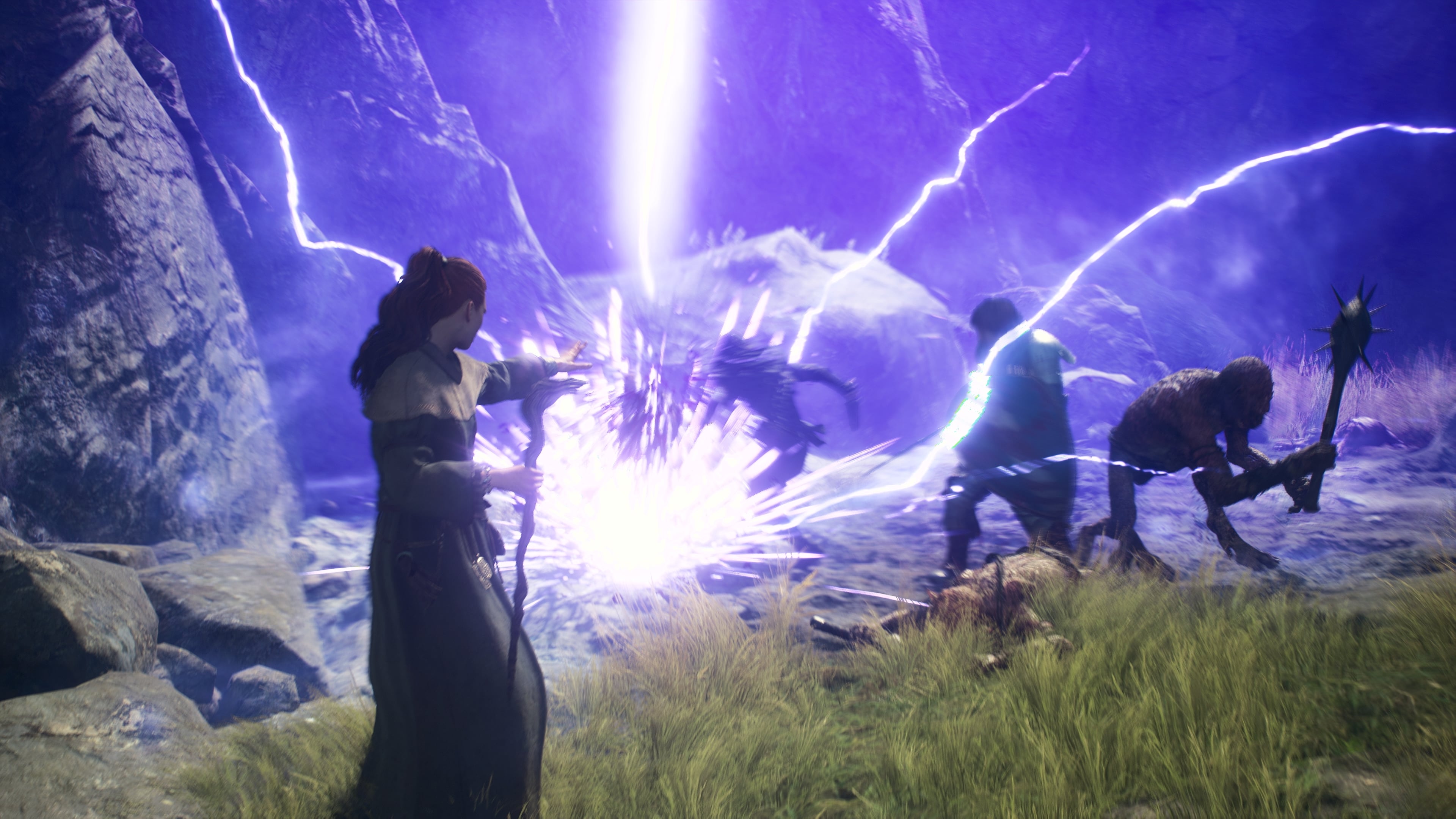
Travelling from town to town in Dragon's Dogma 2 feels like a daring expedition. It may take days, so don't forget your camping gear, and enough restoratives (or a healer) to sustain you. Sure, if you really want fast travel, you can hop aboard an oxcart and nap through the ride. But you still might be rudely awakened by a bandit ambush and have to defend your bovine taxi before resuming the journey. In other words, Capcom's sequel is very much the antithesis of Final Fantasy 7 Rebirth's open world, pushing aside convenience for old-fashioned graft.
Release date: March 22, 2024
Platform(s): PC, PS5, Xbox Series X
Developer: In-house
Publisher: Capcom
And of course, oxcarts are only handy when you're going town to town, not when you explore off the hoof-beaten track, dipping into caves, clambering over hills, sniffing around ruins. Expeditions in Dragon's Dogma take so long not only because settlements are distances apart, but because the eye wanders, towards scenery that has to be investigated, or creatures that have to be slain. Before you know it, you're stuck in the wilderness, encumbered, exhausted, travelling by lantern light – like swimming out to sea then realising you may not have the strength to return.
That danger, however, is one reason that the grand sense of adventure in Dragon's Dogma 2 is near unparalleled. Another is that, for all the risk your journeys entail, the tone of Capcom's sequel remains as camp and silly as the first game – a high fantasy that contrasts gloriously against the work of FromSoftware and its Soulslike acolytes. Arguably, it's especially enjoyable from a British perspective, not least because a good chunk of its world feels like one of the rockier areas of our countryside. Like the Peak District, perhaps, but with goblins instead of tea shops. And with the addition of a cast spouting ye olde English – a lot of 'well mets' and 'mayhaps' – it feels less like Lord of the Rings than a live role-playing weekend with friends, each giving am-dram earnestness to their character as they roam the woods bashing each other with latex maces.
Pawn Cocktail
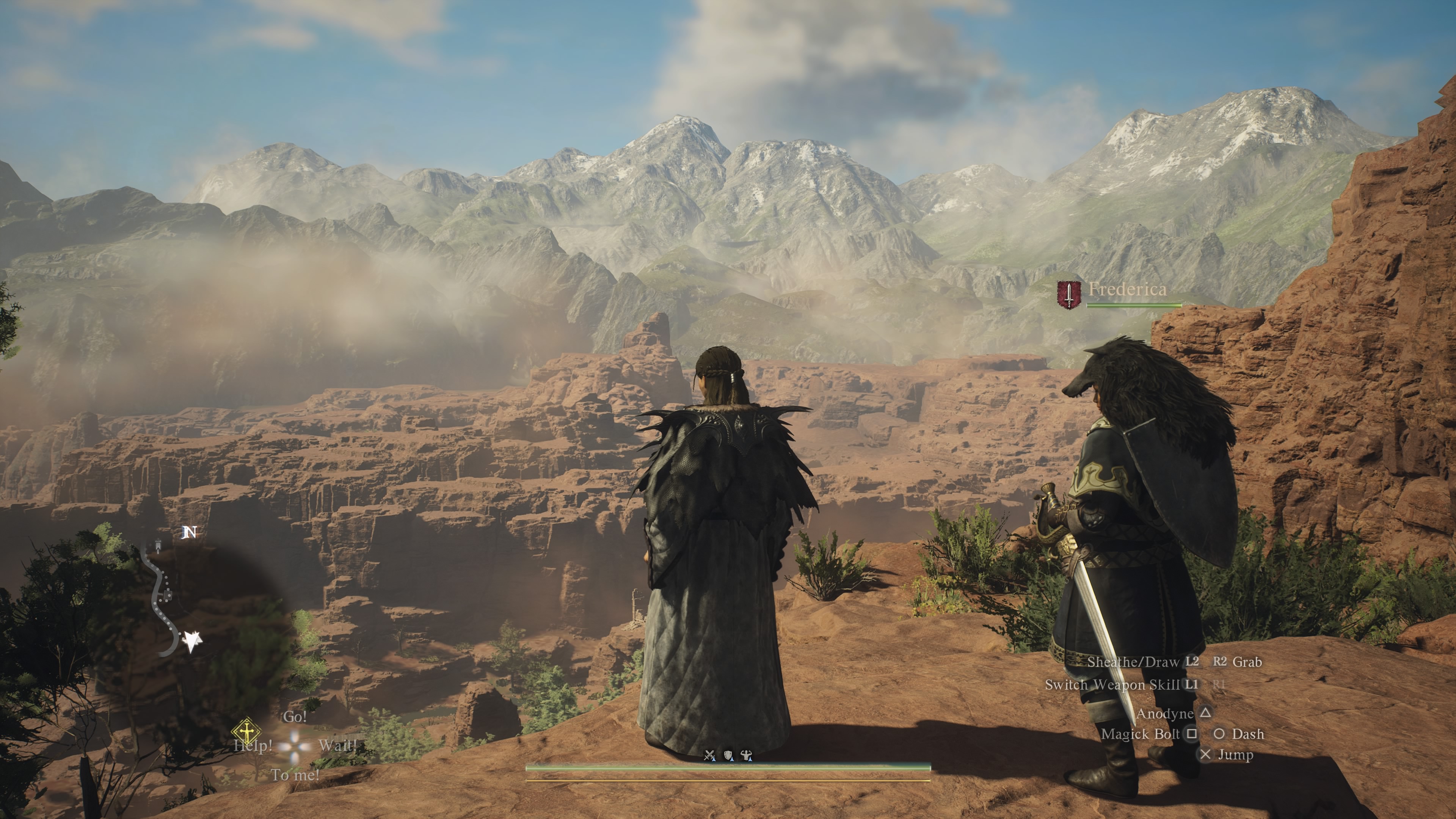
Friends are another of the essential ingredients making Dragon's Dogma 2 so oddly compelling too. In this case, as in the original game, those accompanying your silent protagonist – a 'chosen one' type known as the Arisen – are folk called pawns. You can have up to three of these upbeat AI-controlled companions by your side at once, their sole purpose in life to help you succeed. One of the three is your permanent 'main' pawn, whose appearance, class, and abilities you select. The rest you summon from the 'rift', in effect a server where copies of other players' main pawns gather, waiting to be picked for alternate adventures.
Choosing auxiliary pawns from the rift thus equates to borrowing other people's creations to fill out your party, and they may use yours, which adds a wonderful communal touch to proceedings. And because borrowed pawns don't level up while working with you, it's necessary to keep swapping them for others, perhaps trying out different class lineups – do you stick to the basic balance of fighter, thief, archer, sorcerer, or experiment? – all the while gaining a window into what fellow Arisen have conjured from Dragon's Dogma 2's detailed character creator and what kind of equipment they've discovered.
As for the personalities of pawns, well, they can be quite irritating, but nevertheless endearing. They're irritating chiefly because they talk too much, jabbering on with hints and observations that may be painfully obvious or irrelevant to what you're trying to achieve. Their chatter also repeats a little too frequently. The first time one comments that, say, your party is all female, you might be impressed at their attentiveness. The tenth time, not so much.
Yet they're endearing in part because of this looping verbal diarrhoea. What Capcom has done here is take the classic dumb RPG NPC and fold it into the lore of its game world. As such, pawns are a kind of distilled essence of RPG people, devoid of human concerns beyond completing quests, securing treasure and defeating monsters, to which they display boundless enthusiasm. In particular, they buzz with joy at the sight of treasure chests, hilariously so when said chest is actually just a strong box in someone's house, which in their eyes is some great prize ripe for plunder. Oh, and ladders. They love ladders. But hey, RPG ladders are exciting – who knows what might be found at the top?
The bigger They Come
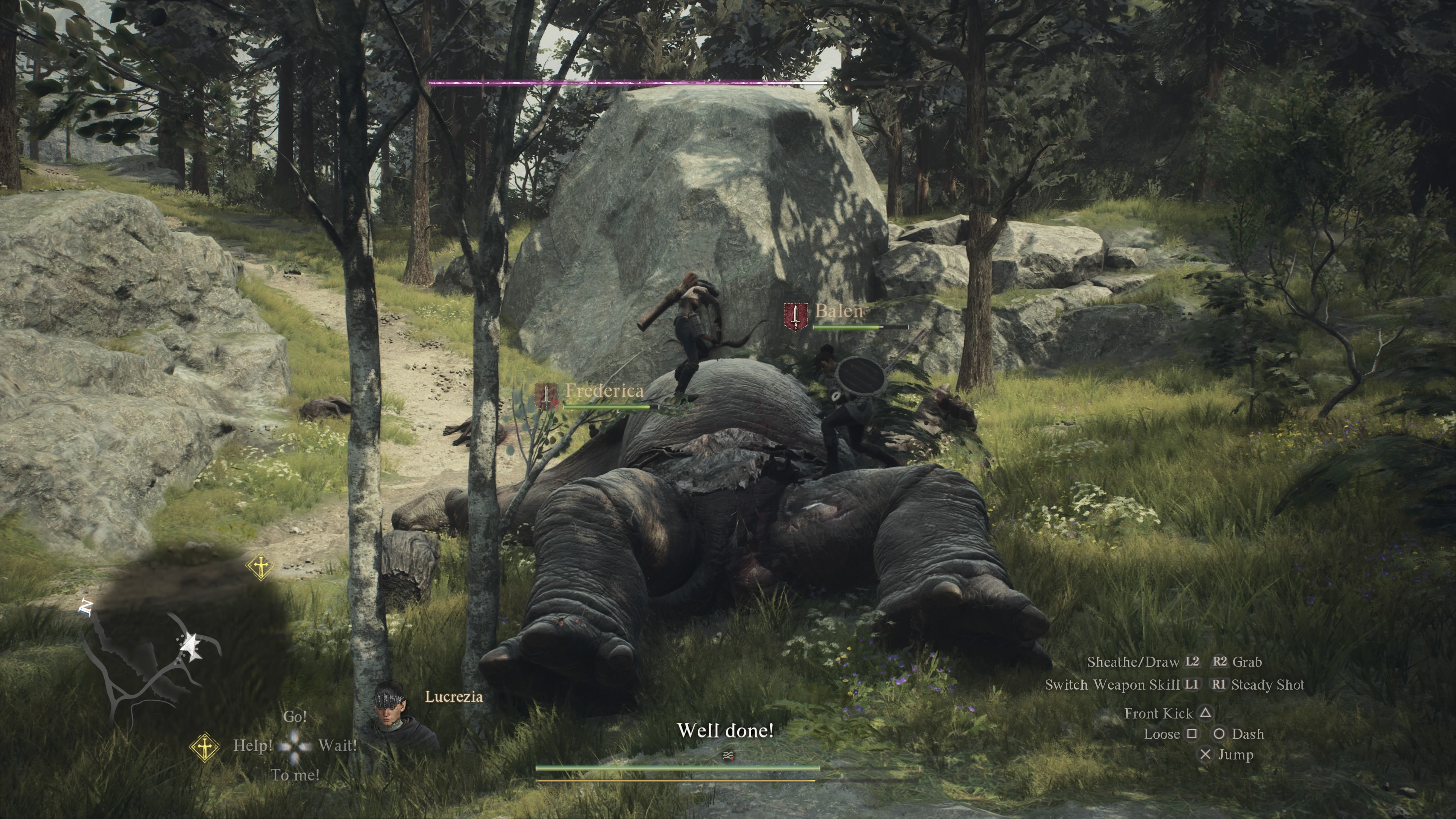
Pawns are not merely comedy cheerleaders, however. For one, they do point out interesting stuff you may have missed, including bringing information from other worlds they've travelled with other Arisen. But most importantly, they'll fight tooth and nail for your cause, gamely charging towards the largest of creatures unless you beckon them away. And most of the time you won't, since combat is Dragon's Dogma 2's other strength, drawing on Capcom's own Monster Hunter series as much as any other RPG.
In terms of your own participation in skirmishes, the game does a fine job of making each class (four to start with, nine in all) genuinely different to play. As an archer, for example, you must use height and range to your advantage, while a sorcerer needs precious seconds to invoke powerful elemental spells. All are worthy choices – you'll likely try at least a few in the course of a play through – with bespoke special attacks and techniques to learn as you level up. Levitation lets a sorcerer reach higher ground or blast foes from beyond their reach, for example, while a thief can yank them around with a grappling hook.
Mix these skills together with those of your pawns and the result is often merry chaos, especially against giant marquee monsters such as cyclops, ogres and chimeras, which are even more magnificent to behold this time, and have a habit of dropping in unannounced. Sure, some dwell within foreboding caves where you'd expect to meet them, but now and again an enormous griffin might swoop out of the sky, or you might arrive back at the capital to find the city guard in a pitched battle with a cyclops that had presumably ambled through the main gate, and join the effort to bring it down.
In such encounters, you can't merely hammer away at their ankles to drain their ample life bars either. Targeting weak spots is crucial to victory, and so is climbing their backs to stab their soft bits up close. Topple them over and you have the pleasure of piling on to give the beast a battering, although give them half a chance and they're quite capable of knocking you over instead, so care has to be taken. Not that smaller foes should be taken lightly either. A goblin ambush can be as alarming as it is amusing, as one of the blighters leaps out from behind a rock and delivers a concussive shield bash. You need to have your guard up at all times in Dragon's Dogma 2.
Dragon Aged
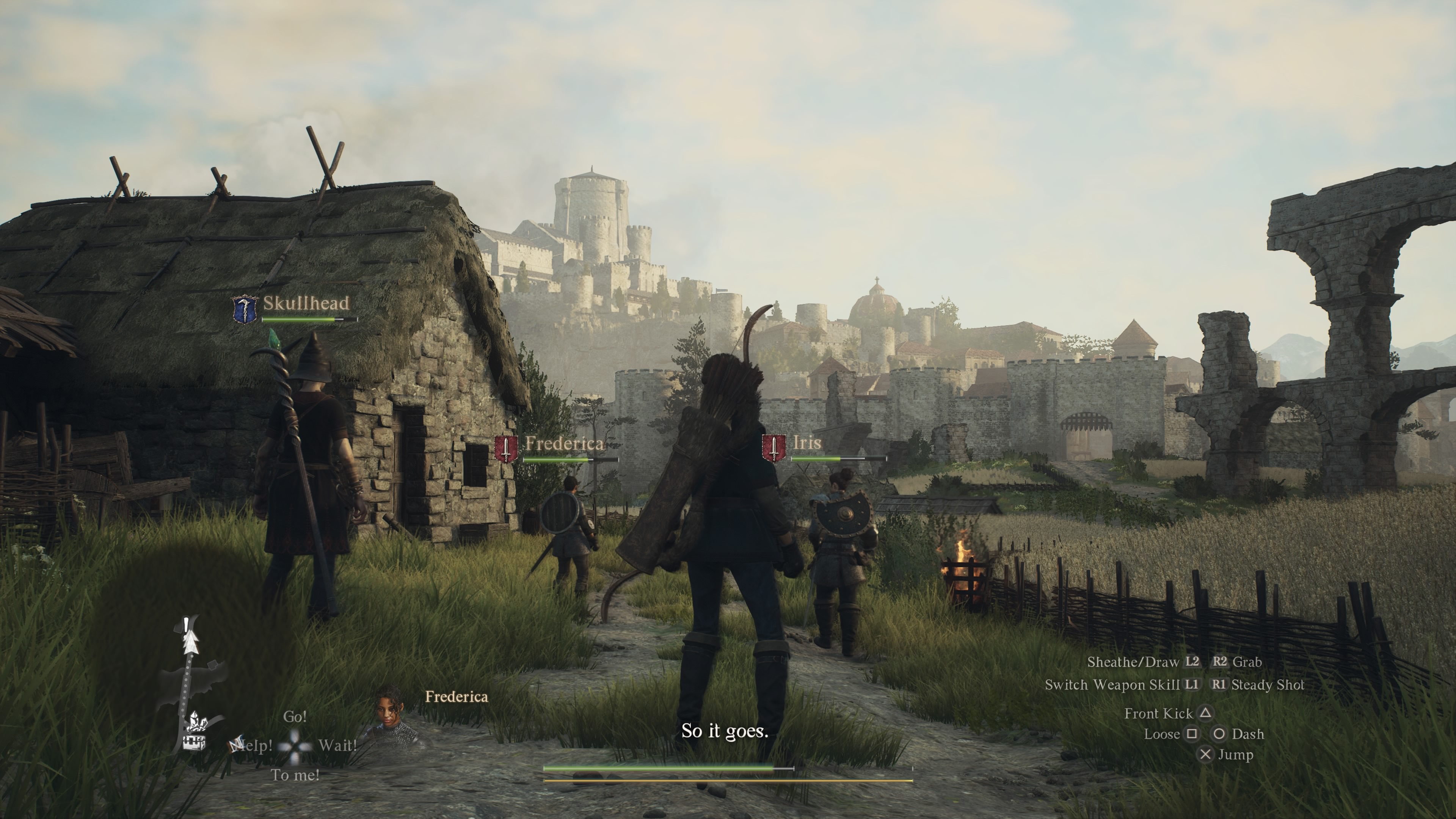
All this improv mayhem is not without downsides, though. At times, you can be unreasonably swamped by gangs of enemies converging in a single area, and it's not so awe-inducing if that griffin plunges from the heavens when you're fully focused on fighting an ogre, crushing you under its talons. More frequently, you may struggle to see just what the heck is going on in battles because so many bodies are involved. As an archer, for instance, you rarely take aim without a teammate running across your line of sight (at least there's no friendly fire), while a sorcerer's ice eruption spell might prevent you from spotting an incoming strike.
And like that spell, such issues are the tip of the iceberg in a game that has as many rough edges as it has deft details and intricate systems. What's strange about this sequel is that in many ways it feels as though Capcom was happy to make the same game as it did over a decade ago, that is, a 2012 RPG rather than something more up-to-date. Indeed, while it is overall that bit more sophisticated than before, much of what you've read so far could easily have been written about the original game.
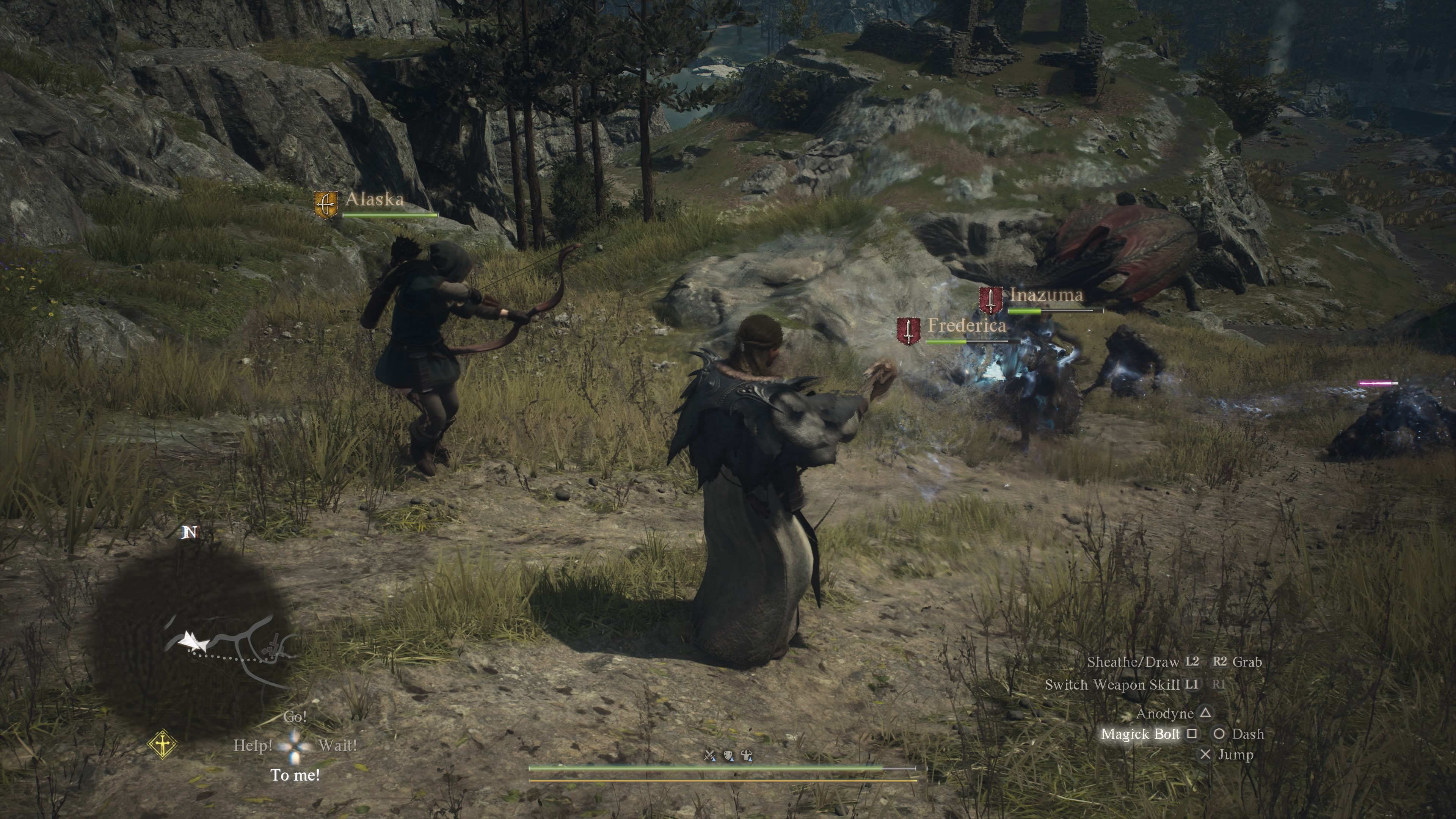
In short, this means you have to put up with an unevenness that seems less acceptable now that it did back then. For example, dialogue and cinematic scenes are haphazardly staged and directed. At one point, a sudden rockslide triggered ahead of my party. As the NPC we were following turned to ask if everyone was alright, a startled family of deer bounded through his body. It's odd because there are some great physical systems in this world – you can collapse a rope bridge to send enemies to their doom (which in turn may force you to seek an alternative route). But other simple reactions don't register, such as trying to stop a minotaur's charge by coaxing him into a tree.
The biggest bugbear, however, is that certain archaic or sloppy features can cause you to waste a lot of time. The goofy writing might be charming coming from characters' mouths, for instance, but not so in poorly explained quest objectives, especially when accompanied by confusing map markers. Quests based within settlements are particularly awful offenders here. I spent several in-game evenings attending a masked ball – a bizarrely muted affair – failing to find the person I needed to contact, and still have no idea what went wrong (thankfully, the plot moved on regardless). Perhaps it was broken, as in a side quest where a merchant roped me into rescuing his missing grandson, Rodge. After saving the boy from being scoffed by wolves, the ungrateful old geezer never acknowledged my achievement.
Also, as magnificent as the long journeys can be, some quests aren't worth completing because fast travel options remain stingy even after you've opened up a good chunk of the map. Yes, you can zip instantly to any location that has a port crystal, and even place your own, but these are few and far between, and each trip requires a rare and expensive consumable. Considering that multi-part quests often require you to return to their point of origin after waiting a few days, if you've moved on by then, it's more trouble than it's worth.
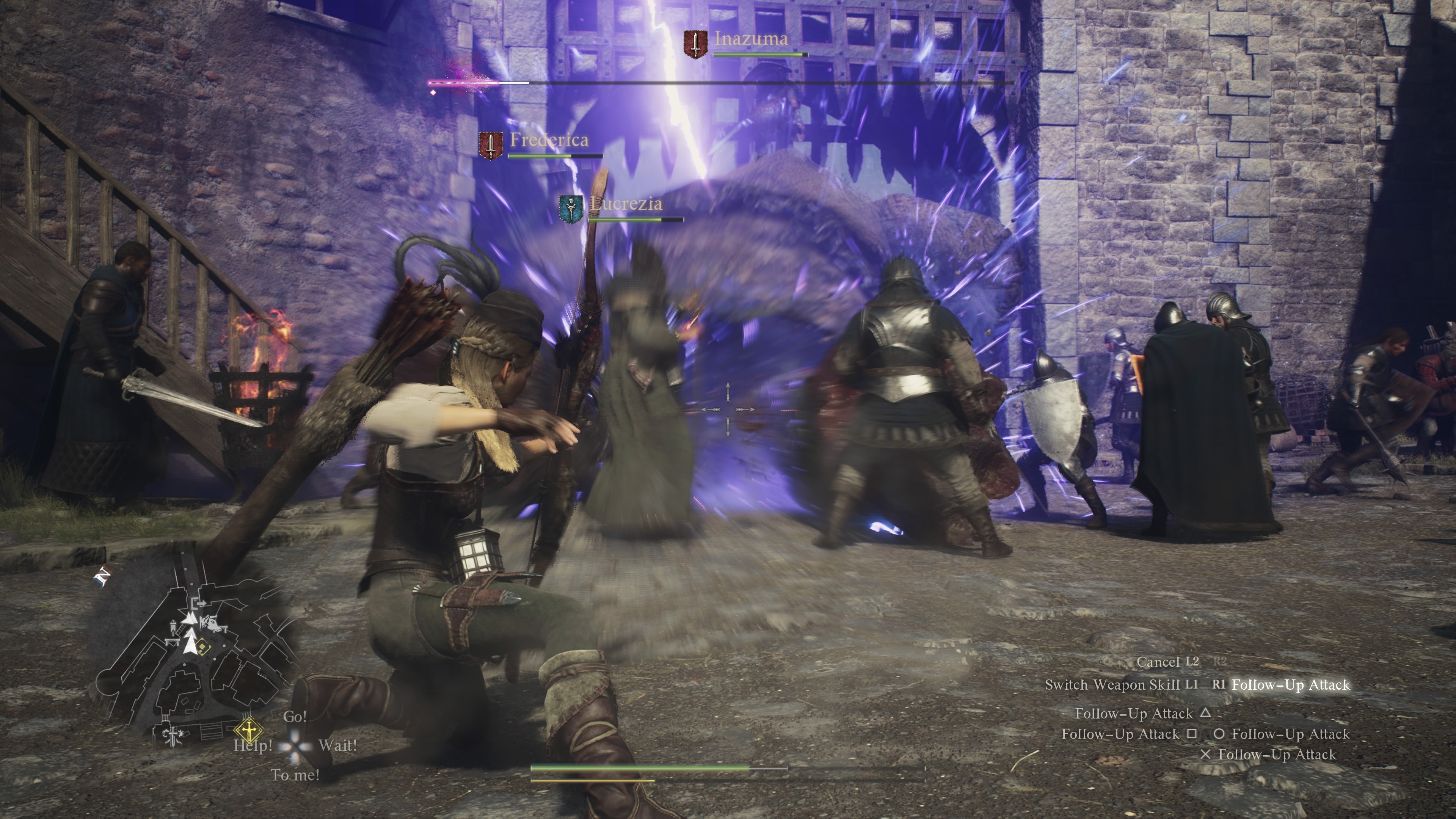
Maybe there's something to be said for convenience after all, then. Certainly, you might wish for a little more when managing your inventory, or while fiddling through shopping and storage menus that aren't quite slick enough. You also might wish for some shortcuts for accumulating cash, since the cost of living crisis really seems to have bitten hard in this realm. Sure, you're relieved to spot a town on the horizon after a gruelling trek, but be assured that the residents have seen you coming too. 2000 gold for a night at the inn? It's not exactly the Ritz, but you haven't got much choice. New armour and weapons are wallet-busters as well, and the less said about the barber the better.
Still, Dragon's Dogma 2 itself remains good value due to that unique vibe and its excellent expeditions. Like its craggy landscape, you take the lows with the highs, the rough with the smooth. Sure, it's not quite the Holy Grail of RPGs, unless you're talking about the Monty Python film. But embrace the chaos and there's nothing quite like it.







